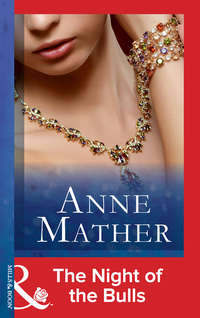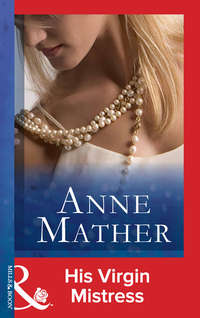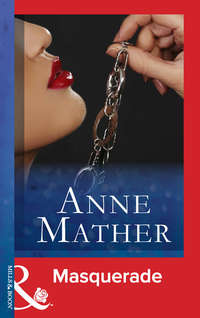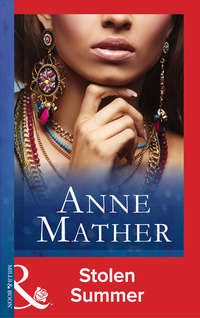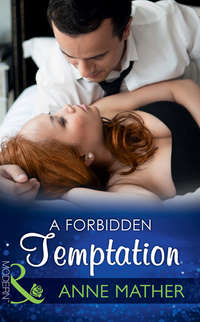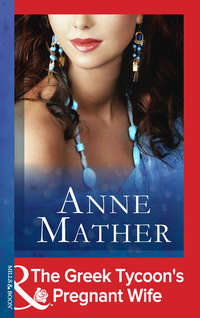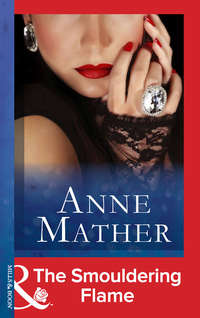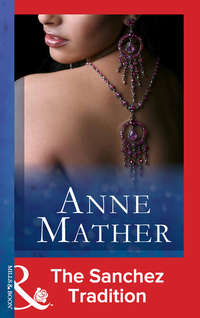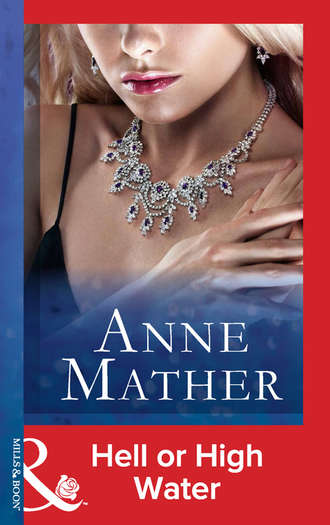
Полная версия
Hell Or High Water
‘So?’ he urged. ‘You’re keeping well? No more of those dizzy turns you were having a month or two ago?’
‘Psshaw, dizzy turns!’ His stepfather was impatient. ‘I’m getting too old, that’s all that’s wrong with me. And you didn’t come here to discuss my aches and pains.’
Jarret sighed. ‘I wish you’d let me find you somewhere—pleasanter, somewhere smaller. Somewhere you could look after your garden, and not have to bother about taking care of a house. A bungalow, for——’
‘I was born in this house, Jarret, and I intend to die here,’ his stepfather interrupted him firmly. ‘It may seem scruffy and old-fashioned to you, after that place of yours up West, but it suits me down to the ground.’
Jarret shook his head. ‘You’re an obstinate old fool, do you know that?’
‘Why? ‘Cause I won’t let you squander your money on me. Humph!’ He chuckled. ‘You save it for those skinny bits of skirt I see you going about with. Don’t know what you see in them, I don’t honestly.’
‘Don’t you?’ queried Jarret lazily, and his stepfather chuckled once again.
‘Well, yes, I guess I do at that,’ he agreed wickedly. ‘But that’s not to say I approve. You’ll be getting yourself into trouble one of these days, and then all that money of yours won’t be enough to get you out of it.’
‘Mmm.’ Jarret took another mouthful of his stout as if considering the point, and the old man continued:
‘Like that Honourable what’s-her-name you used to see sometimes. Margaret something or other.’
‘Lady Margot Urquart,’ amended Jarret dryly. ‘As a matter of fact, I saw her this morning.’
‘Did you?’ His stepfather made a sound of contempt. ‘Soshe’s still hanging around, is she? What the hell do you want with an old bird like her?’
‘I have to remind you that it was Margot who persuaded James Stanford to publish Devil’s Kitchen!’ he retorted, shrugging. ‘Besides, she’s not that old, Paddy. I doubt if she’s even forty.’
‘And you’re thirty-one,’ his stepfather pointed out shortly.
Jarret sighed. ‘Well, as a matter of fact, Margot did have a reason for visiting me …’
‘I can believe it!’
‘No, really.’ Jarret had finished the contents of the bottle and now he took mock-aim at the old man. ‘She’s suggested I buy some place out in the country.’
Patrick Horton absorbed this in silence for several minutes while he examined the contents of his small pantry. Then, realising his stepson expected an opinion from him, he turned and glanced at him over his shoulder.
‘What kind of a place?’
Jarret shrugged. ‘A house—and some land. It belongs to an old school friend of hers.’
‘And who’s going to live there? You and Lady Margot?’
‘Of course not.’ Jarret was impatient now. ‘Me! Just me!’ He pushed back his hair with a weary hand. ‘I’m getting stale, Dad. The words just aren’t coming any more. I need to get away—I’m stifling in London.’
‘What you mean is you’re bored, don’t you?’ his stepfather remarked shrewdly. ‘Too many late nights and too much alcohol. And too many women!’
‘All right!’ Jarret heaved a deep breath. ‘What you say is true. I’m too easily diverted. Maybe out at Thrushfold I’ll be able to breathe again.’
‘Thrushfold?’ His stepfather frowned. ‘Where’s that?’
‘I’m not precisely sure. Somewhere in Wiltshire. The house is called King’s Green. A genuine old property!’ he added, with mock transatlantic reverence.
‘So you’ve made up your mind then?’
‘No.’ Jarret put the bottle on the table behind him and shoved his hands into his jacket pockets. ‘No, I haven’t decided yet. I haven’t even seen it. That’s one of the reasonswhy I wanted to see you—to ask you what you thought. To find out whether you think it’s a good idea or not.’
‘Hmm.’ The old man grimaced. ‘You had anything to eat?’
‘Some toast, at breakfast time,’ replied Jarret patiently. ‘What’s that got to do with anything?’
‘I think I’ll open a tin of soup,’ declared Mr Horton consideringly. ‘Which would you prefer? Chicken or oxtail? It’s all the same to me.’
‘I’ll take you out for lunch, Dad,’ protested Jarret, shaking his head, but his stepfather declined.
‘If my soup’s not good enough for you——’ he began, and with a gesture of acquiescence Jarret shed his coat and reached goodhumouredly for the can-opener.
Later, seated at the kitchen table ladling spoonfuls of oxtail soup into his mouth, Jarret returned to the object of his visit. ‘About this house, Dad,’ he began uncertainly, ‘what do you think? Ought I to go out of town for a while?’
Mr Horton considered for a few moments, and then he nodded his balding head. ‘I’d say it was the best idea you’d had in a long time,’ he asserted, frowning. ‘But not if you take anyone along with you.’
‘If you mean Margot, I’ve no intention of doing so.’
‘I didn’t mean her, actually. I meant that other one I read you’d been seeing. Some model girl, isn’t she? Comes from America. They gave you quite a write-up in the Gazette.’
‘Vivien Sinclair,’ remarked Jarret flatly. ‘Don’t tell me you didn’t notice her name. Yes, she’s a model. And I’ve been seeing her for over six months. But there’s no likelihood of her joining me in my country retreat. She likes the bright lights far too much for that.’
He didn’t sound heartbroken, and his stepfather gave him a disapproving stare. ‘You don’t care, do you?’ he exclaimed, permitting a brief word of criticism. ‘Jarret, when are you going to give up this artificial existence and settle down? You know your mother would have wanted you to.’
‘Oh, Dad!’ The younger man lay back in his chair and surveyed his stepfather humorously. ‘Don’t give me thatold line. What Ma would or would not have wanted is immaterial, isn’t it? I mean—well, she’s dead, and my idiosyncrasies aren’t going to hurt her, are they?’
Patrick Horton sighed. ‘You’ll find your own way to the devil, I suppose,’ he muttered.
Jarret shook his head and sat up again. ‘So how about you coming with me instead? Then you could keep an eye on me, ensure that I ate the right food and got to bed at a reasonable time, and didn’t sleep with any strange women!’
His stepfather’s lips twitched in spite of himself. ‘Oh, no!’ he denied at once. ‘I’m not your keeper, nor would I want to be. And as for removing myself to the wilds of Wiltshire at my time of life—no, thanks!’ He paused. ‘But you go, Jarret, son, you go. I’m all in favour of that. I’m in favour of anything that will make you happy.’
‘Thanks, Dad.’ Jarret leant across to squeeze the old man’s arm, and they finished the meal in a companionable silence.
It was after four when Jarret arrived back at his apartment. Despite the unsatisfactory beginning to his day he felt reasonably content, and half inclined to anticipate the journey to Thrushfold with some enthusiasm. If the house was any good, the sale might be completed before the end of May, with the long lazy days of summer to look forward to. In previous years he had gone to Bermuda and to Cannes, and last year he had spent some time on the west coast of the United States, but the prospect of spending the summer in a home of his own was appealing, and he wondered how he would react to so much isolation.
Vivien Sinclair’s reactions were characteristically opposed to his leaving London.
‘Jarret, you can’t!’ she wailed, when he casually mentioned the idea at dinner that evening. ‘Honey, you’d die in a place like that! Come to Barbados with me next week. You know I’ve got that modelling assignment, and you could work at the hotel while I was at the studios.’
Jarret grimaced. ‘No, thanks,’ he declined gently. ‘I need to work, not to play baby-sitter while you take off your clothes for someone else.’
‘But Jarret,’ she protested, clasping one of his hands in both of hers, regardless of the interested eyes of theirwaiter, ‘when will I see you, stuck out in this Godforsaken hole——’
‘Hardly a hole,’ he corrected her dryly, removing her fingers. ‘Now, do you want yoghurt or ice-cream to finish, or shall I just order coffee for two?’
‘I couldn’t eat another thing,’ she protested sulkily, pulling a handkerchief out of her handbag and sniffing miserably into it. ‘You can get me a brandy with my coffee instead. I need something to sustain me after what you’ve just told me.’
Jarret shrugged and summoned the waiter, and ordered the drinks with the minimum amount of fuss. Then he relaxed in his seat while Vivien recovered her humour, apparently immune to her tearful performance.
‘And when do you leave?’ she ventured at last, when it occurred to her that she was doing herself no favours by causing a scene, and Jarret looked up from lighting a cheroot through the narrowed fringe of his lashes.
‘It’s not even definite yet, Vivien,’ he told her flatly, putting his lighter away. ‘I’m going down to see the place tomorrow. I’ll know more about it after that.’
‘But how did you learn of its whereabouts anyway?’ she exclaimed, putting her handkerchief away. ‘Thrushfold! In Wilshire? I’ve never even heard of it.’
‘The county is Wiltshire,’ Jarret amended, realising he might as well tell her the whole tale. ‘Margot Urquart told me about it. It belongs to an old school friend of hers.’
Vivien evidently suppressed the retort that sprang to her lips, and asked about the house with as much detachment as she could muster. But later that night, when they were alone in her apartment, she could not deny the need for reassurance that only he could give.
‘You—er—you wouldn’t consider marrying Margot Urquart, would you, Jarret?’ she probed, caressing his ear with mildly anxious lips, and Jarret’s laughter came from deep down in his throat.
‘No,’ he agreed, turning his mouth into her nape, and she breathed a sigh of relief as he kissed her.
CHAPTER TWO
‘WHEN did you decide all this?’ Helen Chase rounded on her mother in uncharacteristic aggravation. ‘Couldn’t you at least have discussed it with me first?’
Mrs Chase expelled her breath on a long sigh, and then replied carefully: ‘We have discussed it, Helen. You know that as well as I do. And there is no other solution.’
‘How can you say that?’ Helen made a gesture of frustration. ‘After Charles and I are married——’
‘Yes? After you and Charles are married—what?’ Mrs Chase viewed her daughter with fond affection. ‘My dear, Charles won’t want to live at King’s Green, and as far as keeping two homes going is concerned …’ she shook her head, ‘It’s simply not feasable.’
‘But there must be something we can do.’ Helen paced restlessly across the room, the silky dark hair that resisted all efforts to curl curving under her chin as she moved. She wore it in a simple but effective style, parting it centrally, and allowing the two sides to hang loosely to her shoulders; but now she pushed it carelessly behind her ears, too disturbed by what she had learned to pay any attention to her appearance.
‘There’s not,’ her mother assured her now, resuming the sewing which Helen had interrupted. ‘Since your father died things have gone from bad to worse, and it’s a relief to me to know that you at least aren’t going to suffer by it.’
‘Am I not?’ Helen sounded less than convinced, and her mother looked up once again.
‘Darling, you’re getting married in August. And naturally I’m hoping we can stay here until then. Your father would have wanted it that way. But after the wedding …’
Helen hunched her slim shoulders. ‘I still think you’re acting hastily. I mean, anything can happen between now and August.’
‘Nothing that’s likely to make the slightest improvement in our financial position,’ replied her mother dryly, used toher daughter’s attempts to dissuade her from even considering the idea of selling. ‘And quite frankly, my dear, I’m tired of living this hand-to-mouth existence.’
‘But why involve Margot Urquart?’ demanded Helen, clinging to straws now. ‘I mean—oh, you know what she’s like! And this man, whoever he is, is just the latest in a long line of hangers-on——’
‘Jarret Manning is hardly a hanger-on, darling,’ Mrs Chase remarked evenly, returning to her sewing.
‘Jarret Manning!’ Helen pursed her lips. ‘Imagine selling King’s Green to someone like him!’
Her mother showed a little impatience now. ‘I enjoy Jarret Manning’s work, Helen, and I see no reason for you to criticise the man when you don’t even know him.’
‘Nor do you,’ retorted Helen shortly, and her mother subjected her to a pitying appraisal.
‘It seems to me, Helen, that whoever eventually buys King’s Green, you won’t be satisfied. At least, with Margot’s intervention, we may be spared the humiliation of having to advertise the house and show crowds of curious sightseers over the grounds.’
‘What makes you think Jarret Manning isn’t just a curious sightseer?’ demanded her daughter crossly, and Mrs Chase uttered a sound of irritation. ‘Well,’ continued Helen defensively, ‘he was born in Stepney or Tooting or some such place, wasn’t he? Hardly the background of someone who might find the peace and beauty of King’s Green to their taste!’
‘You little snob!’ Mrs Chase stared at her daughter as if she had never seen her before. ‘Is that what you really think? Is that how you feel? Have I brought you up all these years to regard other people with such contempt?’
‘No, I——’ Helen had the grace to flush now, and the colour deepened becomingly beneath the honey-gold skin of her cheeks. ‘That is—oh, Mummy! Is there nothing else we can do?’
‘What do you suggest?’ Her mother was not inclined to be generous. ‘Turn the Flynns out of the home farm? They could never afford to buy it, but I suppose someone else might.’
‘No! No!’ Helen pushed her fingers through her hairin a revealing gesture. ‘But—Margot Urquart’s latest boy-friend!’
Mrs Chase’s features softened slightly. ‘Look, I know you don’t like Margot,’ she said quietly, ‘but remember, Margot is not involved in the sale.’
Helen shrugged. ‘Perhaps she is. Perhaps she’s serious this time. She’s always coveted King’s Green. Maybe she intends to share it with him.’
Mrs Chase shook her head. ‘My dear Helen, if Margot had wanted to buy King’s Green, why didn’t she just say so?’
Helen shrugged. ‘I doubt if she could stand being so far from London,’ she admitted, and then sighed. ‘Anyway, I wish you’d told me sooner. I’d have arranged to be out or something.’
‘That’s precisely why I didn’t tell you,’ retorted her mother firmly. ‘I had no intention of having to give Margot excuses as to why my daughter had absented herself. And besides, I want your opinion.’
‘Really?’ Helen sounded sceptical. ‘And if I don’t approve?’
Mrs Chase put her sewing aside and rose to her feet. ‘I must go and speak to Mrs Hetherington. Margot said they expected to arrive about midday. If we have lunch at one-thirty, that should give us time to show Mr Manning the house first.’
After her mother had left the room Helen walked disconsolately over to the windows, staring out with fierce possessiveness over the lawns and flower-beds that bordered the house. This was her home, it was the place where she had been born, and she knew every inch of it with the familiarity of long use. She could see the daffodils, growing in wild profusion between the old larch and fir trees, and she knew, without even looking, that the wooded slopes beyond would be starred with crocuses and pansies, the paths thick with a carpet of pine needles. How could she contemplate handing King’s Green over to some stranger without feeling this pang of helplessness and resentment? Particularly when the person involved was one of Margot Urquart’s young men!
Of course, she really knew nothing about Jarret Manning, except what she had read on the flyleaf of one of thebooks her mother collected so avidly. The kind of political thriller he wrote, where the reader was never absolutely sure that what he was reading was fiction or fact, had never appealed to her. She preferred history, in all its various forms, but her mother found them fascinating and was obviously looking forward to meeting the author. There had been a picture of him, too, and it was this as much as anything which aroused Helen’s contempt now. He was young—twenty-five or thirty at most, while Margot had been in her mother’s year at school, and Mrs Chase was forty-two.
Of course, Margot had been married, three times actually, but those associations had not lasted. She was much too susceptible to masculine flattery and attention, and her wealth and carefully preserved looks often attracted younger men. In her position as the daughter of the late Lord Conroy, himself a patron of the arts, Margot would be a very useful ally for a young author to have, decided Helen cynically, and she wondered how they had met.
Her mother coming back into the drawing room at that moment interrupted her cogitation, and she tried to apply herself to what Mrs Chase was saying.
‘You’ll be happy to know that Mrs Hetherington agrees with you,’ the older woman declared tersely, helping herself to a cigarette from the box on the mantelshelf. ‘Really, I just happened to mention that Lady Margot was bringing a prospective buyer down to see the house, and she immediately jumped to the conclusion that she’ll automatically lose her job!’
‘Can you blame her?’ Helen turned from the window to spread her hands expressively. ‘Honestly, Mummy, can you see either of the Hetheringtons working for some—some artist, in whatever category?’
‘Mr Manning is a writer, not an artist.’
‘Writers, artists, they’re all the same,’ declared Helen airily, dismissing the fact that she had never actually met a writer before. ‘Besides, the Hetheringtons are old, Mummy. And you know what they say about old retainers!’
Mrs Chase smoked her cigarette with more aggression than enjoyment. ‘Oh, but I wouldn’t like to think the Hetheringtons were in danger of being dismissed. I mean,Hetherington has looked after the grounds for years! The trees and flowers—they’re his domain. I never interfere, you know that. The greenhouses …’ She paced nervously across to the window and looked her daughter squarely in the face. ‘I shall have to make it a condition of the sale, that the Hetheringtons retain their jobs.’
‘I don’t think you can do that, Mummy,’ retorted Helen bluntly, sustaining her mother’s piercing scrutiny. ‘After all, this isn’t a small business you’re selling, it’s a house. An estate. And for all we know, Jarret Manning may have his own staff of servants.’
‘You don’t really believe that, do you, dear?’
Her mother looked really worried now, and with a sigh Helen moved away from her. There were times when Mrs Chase was just a little too intense, and this was one of them. How could she be expected to know what Jarret Manning’s reactions to the Hetherington’s might be, and in any case, he hadn’t definitely decided to buy the house yet, had he?
‘Oughtn’t we to wait and see what he thinks first?’ she asked now, and to her relief her mother accepted the reprieve.
‘Of course, of course.’ Mrs Chase’s face cleared. ‘He may not like the house at all, and Margot did say he was doubtful about the amount of land …’
‘There you are, then.’ Helen forced a smile and crossed the room to pour two glasses of sherry from the decanter standing on a table near the door. ‘Here, drink this. I think we can both use it.’
‘Mmmm, thank you.’ But Mrs Chase took the glass her daughter offered rather absently, before focussing doubtfully on Helen’s jean-clad figure. ‘Aren’t you going to change, darling? I do think we should represent a certain standard of—breeding, and those jeans are practically indecent.’
‘Now who’s being snobbish?’ enquired Helen dryly, tasting her sherry. Then she looked down at her cotton shirt and matching pants. ‘What’s wrong with what I’m wearing? You look elegant enough for both of us.’
Her mother accepted the back-handed compliment with a wry smile, but she did permit herself a moment’s self-appraisal before acknowledging that it was true. Her pleateddress of soft blue wool disguised the fuller lines of her figure, and the pearls that circled her throat were a gift from her grandmother, and consequently valuable. She looked at home in her surroundings, she thought, fashionable, but not flashy, refined, but not understated.
Helen, for her part, hid her own anxiety, the long lashes drooping over eyes that might reveal her uncertainty. Perhaps she ought to change, she thought, but she rebelled against doing anything which implied an acceptance of Margot’s protégé as the prospective owner of King’s Green.
The sound of a powerful engine approaching the house stilled all other activity, and Mrs Chase looked at her daughter with something resembling panic. ‘It must be them!’ she almost whispered the words, and with a feeling of irritation overcoming her apprehension Helen set down her glass.
‘Who else?’ she agreed tautly. ‘Unless Charles has chosen this moment to put in an appearance.’
‘Do you think he might?’
Her mother looked almost hopeful, but Helen shook her head. ‘Charles is in Cheltenham, as you very well know,’ she retorted, looping her hair behind her ears in a businesslike way. ‘Do you want me to let them in? Then you can greet them here like the gracious hostess you are.’
Mrs Chase looked doubtful, but Helen was already leaving the room, casting a reassuring glance over her shoulder, trying to feel as confident as she looked.
The doorbell pealed as she started across the hall, echoing around the mellow panelling and bringing an increasing awareness of their own vulnerability. She glanced up at the trembling prisms of a chandelier, at the polished carving of the staircase, and realised how much she would miss all this if she had to leave. Marrying Charles somehow had always seemed such a distant thing, and if she had thought of King’s Green at all, it was in terms of her coming here, with her children, bringing them to see their grandmother, and showing them the places where she had played when she was young. She had never pictured the house belonging to anyone else, and even the home Charles was buying for them, beautiful though it was, could nevermean as much to her as King’s Green.
With these thoughts for company she opened the doors to the porch, her unusually pale features remote and uncompromising. To the man and woman awaiting her reception she appeared cold and indifferent, her casual appearance belying the cold hauteur in her face.
In contrast, Margot Urquart seemed warm and animated, her green silk suit complementing the sunflower brightness of her scarf. Careful make-up had taken years from her finely-drawn features, and Helen could quite see that in the right light she might be taken for thirty-five or younger. The stark sunlight of morning was less sympathetic, but nevertheless Margot had a certain feminine appeal that was ageless.
However, it was the man standing slightly behind her who drew Helen’s eyes. She had known what to expect, of course, she had seen his picture on the back of her mother’s book, but even so, she was totally unprepared for the man himself. A photograph was flat, two-dimensional, limited by the demands of black and white, whereas the man who was accompanying Margot was flesh and blood, and infinitely more disturbing than any clever likeness. The picture, for instance, had shown him to have fair hair, but not that silvery fairness that lay smoothly against his scalp, without requiring any unsightly hairdressing. Also, he was darker-skinned than she had expected, absurdly so, considering the lightness of his hair, with blue eyes shaded by long gold-tipped lashes. He was not handsome, his appeal was much more subtle than that, and the faintly mocking twist to his mouth convinced her that he knew that as well as she did. In consequence, Helen stiffened still further, and it was left to Margot to say, rather doubtfully:
‘Mrs Chase is expecting us. Will you tell her we’re here, Miss—er——’
Helen’s reserve broke into unwilling explanation. ‘I’m Helen,’ she said, half believing Margot knew that already, but the other woman’s astonishment seemed genuine enough.


